Creating an Ethical Textile Economy Amid the Pandemic
BY MEGANNE LIEBSCH | July 21, 2020
[Editor’s Note: This is the second in a two-part series highlighting the work of COLLECTION and other partners. You can read part 1, a broader overview of ethical textile production happening in Appalachia, here. Both pieces were originally published by the Jesuit Conference Office of Justice and Ecology, here.]
Poverty, ecological destruction, labor exploitation—these issues are the roots of global injustice. They create a forest of social ills that feels overwhelming and impenetrable. The spread of coronavirus has further confirmed how systemic injustice makes communities especially vulnerable to harm.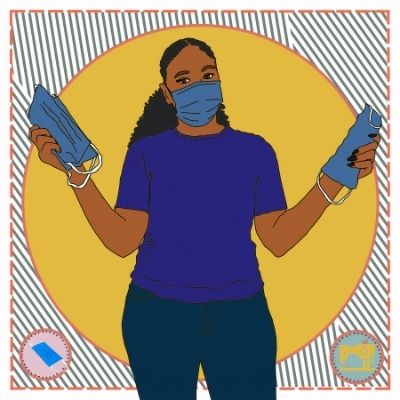
Pope Francis stresses the need for a comprehensive response to economic and environmental injustice through the concept of “integral ecology.” Amid the current public health and economic crisis, his teachings in Laudato Si’ serve as a roadmap to a better future. In order to combat climate change and social injustice, he argues, we must eradicate poverty and end labor exploitation. But how? As individuals, we can often feel powerless, unable to visualize—much less create—a just global ecosystem.
For a group of North Carolina factories, called the Carolina Textile District, the answer is simple: Uplift your local community. This cooperative of textile mills was formed with the goal of revitalizing the local economy with stable jobs. To that end, these manufacturers developed a brand of sustainable textile products, called COLLECTION.
And, through COLLECTION and its parent non-profit The Industrial Commons (in part funded by the Catholic Campaign for Human Development), they have built a movement that prioritizes people over profit. COLLECTION offers a powerful model of a just integral ecology that addresses economic, social, and environmental ills and responds to immediate needs, like coronavirus.
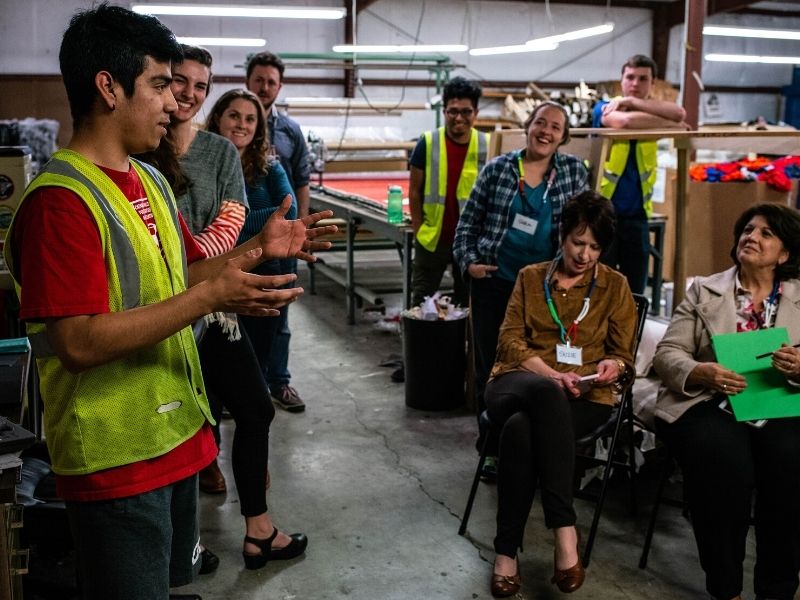
Angel Rojas-Hernandez, is an employee at The Industrial Commons enterprise, Material Return. Here, he speaks to a gathering of Catholic and Jesuit leaders about his work recycling unused fabrics.
Collaboration is central to the success of the COLLECTION model. Over the years, they built collaborations with workers, community colleges, art education non-profits, clothing brands, and suppliers, like their partner Ethix Merch, plus Catholic dioceses and Jesuit schools. Through these partnerships, COLLECTION works to uplift their local community by promoting environmental sustainability, fair labor practices, and overall economic health.
Amid the pandemic, COLLECTION’s community commitment has taken on a new focus. With numerous reports of virus outbreaks in production lines across the country, the need to put people over profit is clear.
“Just like with climate change, the worst effects of the pandemic have fallen on the most vulnerable communities, owing to the drastic inequalities in resource allocation across the globe,” says Ethix Merch CEO Daniel Cardozo. His company partners with COLLECTION to brand and supply their ethical products, including masks, to institutions. “Supporting sustainable manufacturing and fair labor conditions—through organizational and individual purchasing—is like casting a vote that says ‘enough of this.’ When we reward companies who incorporate these values into their business models, we restore power and resilience to the human beings who toil for our comfort and (in the case of personal protective equipment) for our safety and our lives.”
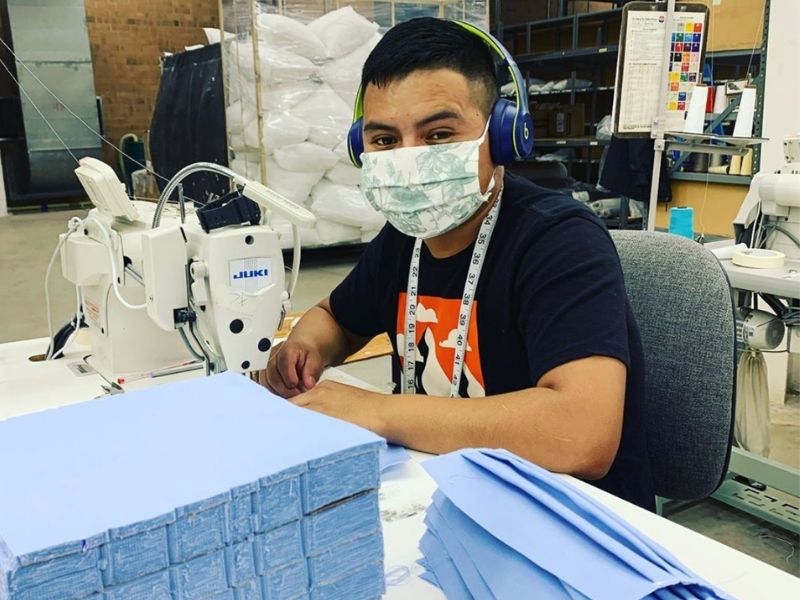
Francisco Son Chay, a PPE Cohort member with Opportunity Threads, sews the company’s “Pedestrian Mask.”
COLLECTION’s partner factories have instituted stronger worker health and protection protocols to support their communities. In a few short weeks, they retooled their textile factories to produce much-needed personal protective equipment (PPE). Since April, 60 manufacturers have made 400,000 units of PPE for essential workers and local communities.
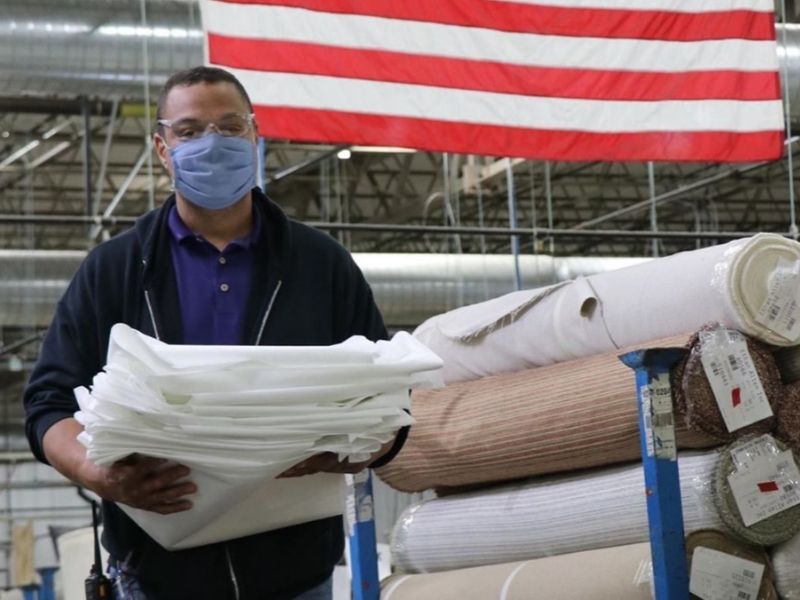
Brandon, Roberts, a PPE Cohort member with Ethan Allen, carries fabric for PPE gowns.
“We’ve always been a community. We’ve always been connecting the supply and the demand through our services,” says Libby O’Bryan, who runs a COLLECTION-affiliated textile company. Dedicating production to PPE felt like the natural response for their manufacturers, she says.
COLLECTION has worked closely with physicians to develop sustainable and high-quality PPE for essential workers and healthcare professionals. Through Ethix Merch, they are also working to provide masks to the public.
“The COLLECTION masks are unique in their integrity,” says Cardozo. “The masks offer the perfect opportunity for the community to support COLLECTION’s robust ethical standards, because people can easily understand that an item they put directly over their face to stay safe should also be produced in a way that protects the maker and the environment.”
So far, Ethix Merch and COLLECTION have sold 1,800 masks, and they hope to reach 20,000 by the end of July. Their clients include several Ignatian organizations—the Ignatian Solidarity Network, Marquette University Alpha Sigma Nu, Holy Trinity School, and St. Peter’s Catholic Church.
St. Peter’s, a Jesuit parish in Charlotte, North Carolina, purchased over 50 masks for its teen service program, which partners young volunteers with local charities and ministries. Branded with the signature Jesuit sunburst, the masks embody St. Peter’s commitment to Catholic social teaching, says parish faith formation director Cathy Chiapetta.
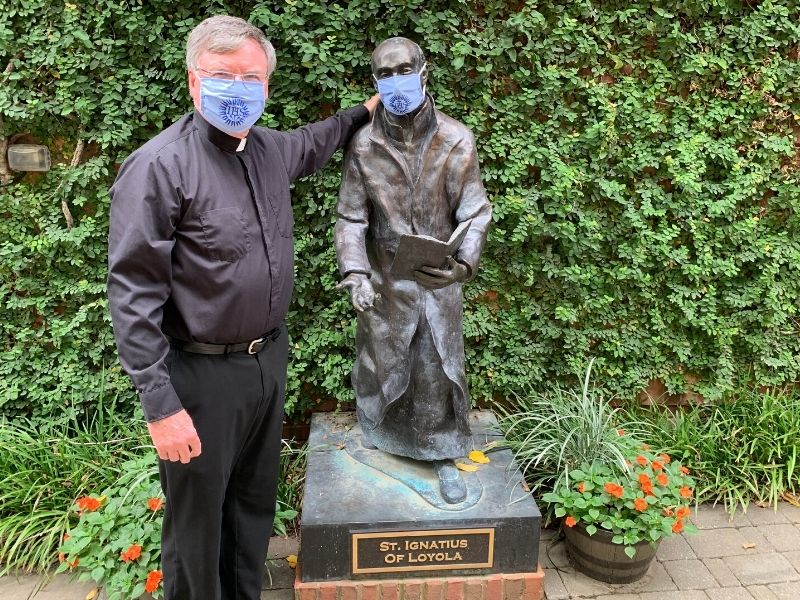
Fr. Jim Shea, S.J., pastor of St. Peter Catholic Church in Charlotte, NC with St. Ignatius of Loyola, wearing a COLLECTION mask.
“One of the principles of being a Jesuit Catholic church is that you’re men and women for others. We also say men and women with others. We like COLLECTION because we know that it supports our mission—by supporting and protecting creation and having a living wage that respects the dignity and rights of workers.”
Normally, the parish would purchase T-shirts for the teens, but “it just didn’t seem like the right way to spend money,” says Chiapetta. Instead, St. Peter’s chose the COLLECTION masks, which will protect the volunteers and the folks they serve.
The masks are also a symbol of solidarity. By supporting local textile artisans and eco-friendly production in North Carolina, St. Peter’s is living its mission of social justice, says Chiapetta.
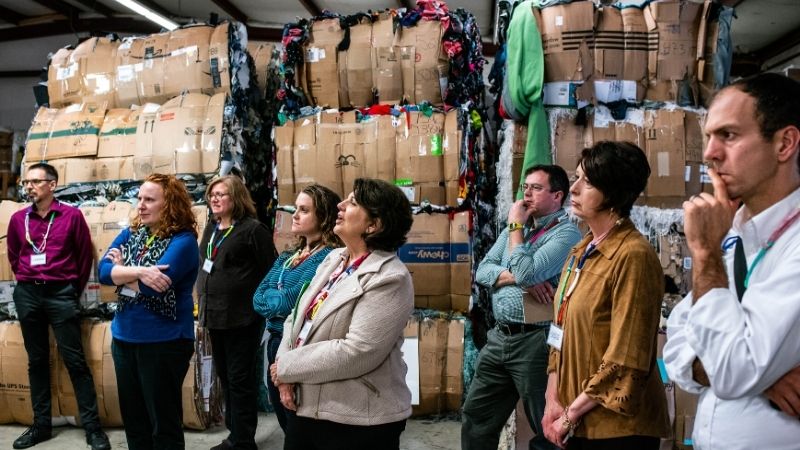
Christopher Kerr (right), Ignatian Solidarity Network executive director, visits the network’s fabric recycling company, Material Return, with other Catholic leaders early in 2020.
A long-time supporter of Ethix Merch and COLLECTION, the Ignatian Solidarity Network offers a “Solidarity” facemask through their online store.
“Wearing a mask is an act of solidarity—it protects others as much as it protects yourself,” says ISN director Christopher Kerr. “Intentionally choosing an ethically-made mask furthers that commitment of solidarity, ensuring that the inherent dignity of those who make your mask is affirmed through your purchase. This goes for the Earth too, ensuring that God’s creation is cared for through the materials and methods utilized to produce a face mask.”
Get involved
Before Covid-19, Jesuit and Ignatian organizations including the Ignatian Solidarity Network, Boston College High School, Creighton University’s Center for Service and Justice, Georgetown University Alternative Breaks Program, and Scranton Prep, sourced merchandise through Ethix Merch and COLLECTION. Now, Ethix Merch hopes to expand these partnerships with Jesuit-branded face masks.
Schools and institutions can use their purchasing power to support ethical and sustainable practices by contacting: to [email protected]. To keep up with COLLECTION and this thriving ecosystem, follow @createtheCOLLECTION on Instagram.
MegAnne Liebsch is the communications manager for the Office of Justice and Ecology of the Jesuit Conference of Canada and the United States. She holds a master’s degree in media and international conflict from University College Dublin and is an alumna of La Salle University. She is based in Washington, D.C.

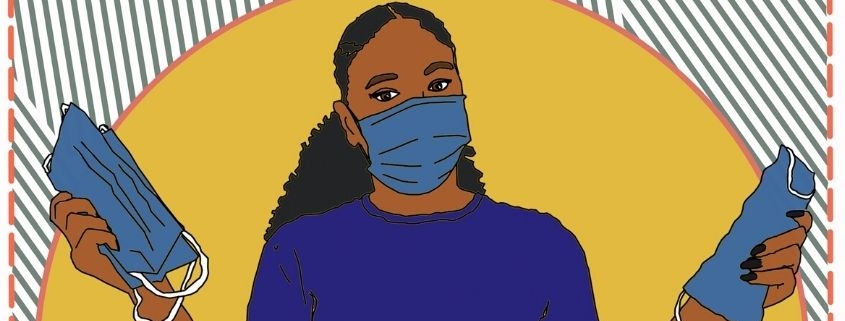
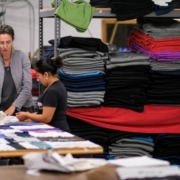
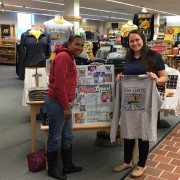
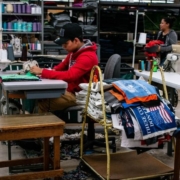

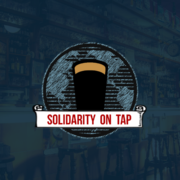
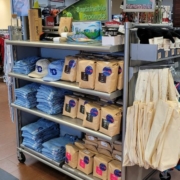

Uplifting one’s local community is the first step in world-building. Supporting local textile artisans and eco-friendly production are Gandhian ways of proceeding.